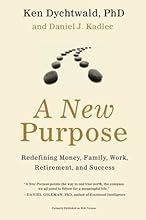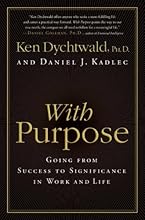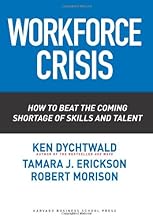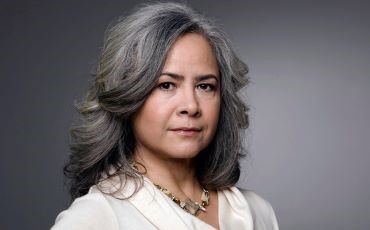Founder & CEO of Age Wave, Psychologist, Gerontologist, Documentary Filmmaker, Entrepreneur & Best-Selling Author
Ken Dychtwald Biography
Over the past 45+ years, Dr. Ken Dychtwald has emerged as North America’s foremost visionary and original thinker regarding the lifestyle, marketing, health care, economic, and workforce implications of the age wave. His insights into the massive, untapped market of consumers aged 50 and above, who control a significant portion of total wealth and consumer spending in various sectors, have been pivotal.
Dychtwald is a psychologist, gerontologist, and best-selling author of 19 books on aging-related issues, including "Bodymind," "Age Wave: The Challenges and Opportunities of an Aging Society," "Age Power: How the 21st Century Will Be Ruled by the New Old," "Healthy Aging," "Gideon’s Dream: A Tale of New Beginnings," "A New Purpose: Redefining Money, Family, Work, Retirement, and Success," "What Retirees Want: A Holistic View of Life’s Third Age," and "Sages of Aging: A Guide for Changemakers." His memoir, "Radical Curiosity: My Life on the Age Wave," was updated and re-released in September 2023. He was the executive producer and host of the highly rated PBS documentary "The Boomer Century: 1946–2046," which aired over 2,000 times on PBS stations nationwide, as well as the public television special "Life’s Third Age." "Sages of Aging" is Dychtwald’s latest national public television program featuring profound conversations with twelve of the leading pathfinders in the fields of aging.
Since 1986, Dychtwald has been the Founder and CEO of Age Wave, an acclaimed think tank and consultancy focused on the social and business implications and opportunities of global aging and rising longevity. His client list has included over half the Fortune 500. He has served as a fellow of the World Economic Forum and was a featured speaker at two White House Conferences on Aging. In 2023, Dychtwald received the distinguished American Society on Aging Award for outstanding national leadership three times and, most recently, was awarded the President’s Award from ASA. American Demographics honored him as the single most influential marketer to baby boomers over the past quarter century. His article in the Harvard Business Review, “It’s Time to Retire Retirement,” was awarded the prestigious McKinsey Award, tying for first place with the legendary Peter Drucker. He was honored by Investment Advisor as one of the 35 most influential thought leaders in the financial services industry over the past 35 years. Dychtwald and his wife, Maddy, recently received the Esalen Prize for their outstanding contributions to advancing the human potential of aging men and women worldwide. In 2018 he was awarded the Inspire Award from the International Council on Active Aging for his exceptional and lasting contributions to the active-aging industry and for his efforts to make a difference in the lives of older adults globally. In 2020, he was the first recipient of the Pioneer Award from the Retirement Coaches Association.
During his career, Dychtwald has addressed more than two million people worldwide in his speeches to corporate, association, social service, and government groups. His strikingly accurate predictions and innovative ideas are regularly featured in leading print and electronic media worldwide and have garnered over twenty billion media impressions. His work emphasizes the need for new approaches in retirement planning, considering changes in life expectancy, financial security, and family dynamics, and advocates for the elimination of ageism and the envisioning of an abundantly healthy, continually curious, and purposefully satisfying life in old age.
Contact a speaker booking agent to check availability on Ken Dychtwald and other top speakers and celebrities.
Ken Dychtwald Speaking Topics
-
How The Age Wave Will Transform the Marketplace, the Workplace and Our Lives
Increasing longevity, declining fertility, and the aging of the Baby Boomers are triggering an enormous age wave. This unprecedented demographic transformation is creating tremendous opportunities in the marketplace, the workplace and our lives – alongside equally pressing social, political, and financial challenges.
In this presentation, Age Wave Founder and CEO Ken Dychtwald PhD will explore some of the most urgent questions facing individuals, families, businesses and governments, including:
- How the emerging
• and unprecedented
• longevity revolution is altering today’s demographic landscape
- How people will use their newfound “longevity bonus”
- Why a “cyclic” life plan is replacing the traditional “linear” model
- How aging Baby Boomers and Gen Xers are changing the paradigms of health, work, leisure, and retirement
- What are the biggest new market opportunities – many of which are hiding in plain sight?
Conclusion:
In this illustrative, forward-thinking keynote, Ken Dychtwald will shine a light on actionable ways your organization can be better prepared for the changing demographic landscape and the countless opportunities that are emerging.
- How the emerging
-
How the Growing Pursuit of Longevity will Disrupt Health and Healthcare"
In this revealing glimpse into the future, Age Wave Founder and CEO, Ken Dychtwald, PhD will provide a wide-ranging preview of how global population aging and increasing longevity will dramatically transform every dimension of health and healthcare.
Topics to be explored include:
- Have we entered a new age of aging and how long might we live?
- Will our later years be a time of health and vitality or illness and disability?
- What advances are needed in diagnostics, bio-science, and medical/nursing training and skills to ensure that our healthspans and brainspans match our lifespans?
- How do we feel about all of the “longevity inequality” that currently exists?
- Will super-longevity be purchasable on the open or black market?
- How will we spend our “longevity bonus” years and what will be the new purpose of elderhood?
Conclusion:
This visionary keynote will inspire and motivate attendees to activate medical, social, business, policy and/or technology strategies to contribute to a far-improved healthcare system.
Ken Dychtwald Videos
Ken Dychtwald, Ph.D. keynotes USAging's 50th Annual Answers on Aging Conference
Ken Dychtwald's Future Vision of Health, Aging and Longevity Due to the combination of rising longevity, declining fertility and the aging of the...






-
How do I book Ken Dychtwald to speak at my event?
Our experienced booking agents have successfully helped clients around the world secure speakers like Ken Dychtwald for speaking engagements, personal appearances, product endorsements, or corporate entertainment since 2002. Click the Check Availability button above and complete the form on this page to check availability for Ken Dychtwald, or call our office at 1.800.698.2536 to discuss your upcoming event. One of our experienced agents will be happy to help you get speaking fee information and check availability for Ken Dychtwald or any other speaker of your choice. -
What are the speaker fees for Ken Dychtwald
Speaking fees for Ken Dychtwald, or any other speakers and celebrities, are determined based on a number of factors and may change without notice. The estimated fees to book Ken Dychtwald are $50,000 - $100,000 for live events and $30,000 - $50,000 for virtual events. For the most current speaking fee to hire Ken Dychtwald, click the Check Availability button above and complete the form on this page, or call our office at 1.800.698.2536 to speak directly with an experienced booking agent. -
What topics does Ken Dychtwald speak about?
Ken Dychtwald is a keynote speaker and industry expert whose speaking topics include Aging, Author, Business, Business Authors, Business Consulting, Business Leadership, Customer Experience, Disruptive Thinking, Economy, Entrepreneurship, Finance, Fitness, Futurism, Generational Issues, Health & Wellness, Healthcare, Human Resources, Marketing, Motivational, Sales, Science, Technology, Television & Film, Thought Leadership -
Where does Ken Dychtwald travel from?
Ken Dychtwald generally travels from San Francisco, CA, USA, but can be booked for private corporate events, personal appearances, keynote speeches, or other performances. For more details, please contact an AAE Booking agent. -
Who is Ken Dychtwald’s agent?
AAE Speakers Bureau has successfully booked keynote speakers like Ken Dychtwald for clients worldwide since 2002. As a full-service speaker booking agency, we have access to virtually any speaker or celebrity in the world. Our agents are happy and able to submit an offer to the speaker or celebrity of your choice, letting you benefit from our reputation and long-standing relationships in the industry. Please click the Check Availability button above and complete the form on this page including the details of your event, or call our office at 1.800.698.2536, and one of our agents will assist you to book Ken Dychtwald for your next private or corporate function. -
What is a full-service speaker booking agency?
AAE Speakers Bureau is a full-service speaker booking agency, meaning we can completely manage the speaker’s or celebrity’s engagement with your organization from the time of booking your speaker through the event’s completion. We provide all of the services you need to host Ken Dychtwald or any other speaker of your choice, including offer negotiation, contractual assistance, accounting and billing, and event speaker travel and logistics services. When you book a speaker with us, we manage the process of hosting a speaker for you as an extension of your team. Our goal is to give our clients peace of mind and a best-in-class service experience when booking a speaker with us. -
Why is AAE Speakers Bureau different from other booking agencies?
If you’re looking for the best, unbiased speaker recommendations, paired with a top-notch customer service experience, you’re in the right place. At AAE Speakers Bureau, we exclusively represent the interests of our clients - professional organizations, companies, universities, and associations. We intentionally do not represent the speakers we feature or book. That is so we can present our clients with the broadest and best performing set of speaker options in the market today, and we can make these recommendations without any obligation to promote a specific speaker over another. This is why when our agents suggest a speaker for your event, you can be assured that they are of the highest quality with a history of proven success with our other clients.
Ken Dychtwald is a keynote speaker and industry expert who speaks on a wide range of topics such as How The Age Wave Will Transform the Marketplace, the Workplace and Our Lives, How the Growing Pursuit of Longevity will Disrupt Health and Healthcare", How the Growing Pursuit of Longevity will Disrupt Health and Healthcare", How the Growing Pursuit of Longevity will Disrupt Health and Healthcare", Reinventing Retirement: Your Grandparents’ Retirement is Over, How the Growing Pursuit of Longevity will Disrupt Health and Healthcare" and The Longevity Revolution: Triumph or Tragedy?. The estimated speaking fee range to book Ken Dychtwald for your event is $50,000 - $100,000. Ken Dychtwald generally travels from San Francisco, CA, USA and can be booked for (private) corporate events, personal appearances, keynote speeches, or other performances. Similar motivational celebrity speakers are Maddy Dychtwald, Ray Kurzweil, Don Peppers, Richard Florida and Peter Diamandis. Contact All American Speakers for ratings, reviews, videos and information on scheduling Ken Dychtwald for an upcoming live or virtual event.
This website is a resource for event professionals and strives to provide the most comprehensive catalog of thought leaders and industry experts to consider for speaking engagements. A listing or profile on this website does not imply an agency affiliation or endorsement by the talent.
All American Entertainment (AAE) exclusively represents the interests of talent buyers, and does not claim to be the agency or management for any speaker or artist on this site. AAE is a talent booking agency for paid events only. We do not handle requests for donation of time or media requests for interviews, and cannot provide celebrity contact information.
If you are the talent and wish to request a profile update or removal from our online directory, please submit a profile request form.































